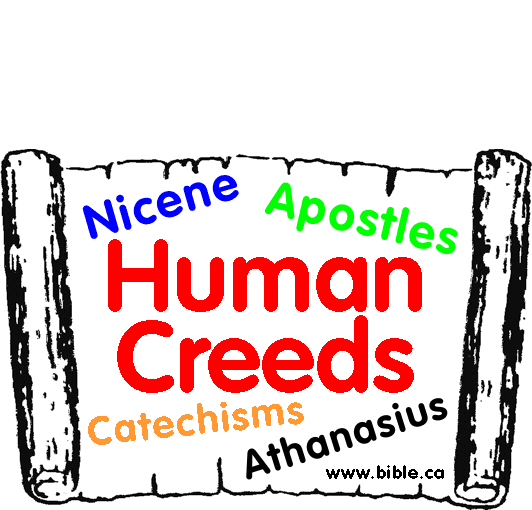Sola Scriptura: The illumination of the creeds by the Holy Spirit is false doctrine!
Illumination of creeds by the Holy Spirit is a false doctrine and contrary to "sola Scriptura": Too many churches hold to this destructive and deceptive doctrine. If your church has a creed, chances are they teach this false doctrine!
Protestant/Reformed: Inward Witness Creedalists falsely believe creeds are "functionally equal" to scripture:
The Holy Spirit is the ultimate criterion of truth, but He bears witness to the truth through this reciprocal relationship between Christian Scripture, the Christian Church, and the Christian creed. Each of these three relates to the other two in a unique way. The Scripture is the Spirit-inspired Word of God that bears witness to the truth of the regula fidei and bears witness to the identity of the Church. (The Shape Of Sola Scriptura, Keith A. Mathison, Reformed Protestant, 2001, p 267)
"The question is not whether one will have a creed or not have a creed. The only question is what creed one will have. Creeds and confessions are necessary to a proper understanding of scriptural authority. Without the use of creeds, it is impossible to establish objective doctrinal boundaries within the church." (The Shape Of Sola Scriptura, Keith A. Mathison, Reformed Protestant, 2001, p 277)
One way in which we identify the Christian churches is their adherence to the apostolic regula fidei. But what does this mean? It means that we can identify the fragments of the true visible Church by their acceptance of the common testimony of the Holy Spirit in the rule of faith, especially as expressed in written form in the ecumenical creeds of Nicea and Chalcedon. The Holy Spirit has born a miraculously unanimous witness to the same twenty-seven books of the New Testament throughout a confessing Christendom, and the Holy Spirit has born a miraculously unanimous wit-ness to a common fundamental creed throughout this same Christendom. This means that ultimately the Holy Spirit is the criterion of truth. But His testimony is made manifest through the corporate witness He bears in the hearts and minds of Christ's people. The Holy Spirit bears witness corporately to the canon; He also bears witness corporately to the essential truths of Christianity-the rule of faith. (The Shape Of Sola Scriptura, Keith A. Mathison, Reformed Protestant, 2001, p 321)
"although Scripture is the sole infallible authority, it must be interpreted by the Church within the boundaries of the ancient rule of faith or regula fidei. According to the teaching of the early Church and of the magisterial Reformation, a rejection of this rule of faith as a hermeneutical boundary is a rejection of the perspicuity of Scripture; a rejection of the promise of Christ that the Holy Spirit would teach the Church; and a rejection of the Christian faith. (The Shape Of Sola Scriptura, Keith A. Mathison, Reformed Protestant, 2001, p 147)
"The ecumenical creeds are simply the written form of the confession of the faith of the universal Church. They are a confession of what the Church as a whole has read in the Scriptures." (The Shape Of Sola Scriptura, Keith A. Mathison, Reformed Protestant, 2001, p 279)
"The ecumenical creeds represent the hermeneutical consensus already reached by the Church. They declare the basic essential truths which have been confessed by all Christians from the first days of the Church until today. They represent that which the entire Church has seen in Scripture. ... if the Holy Spirit has been promised to guide the Church into the knowledge of the truth of Scripture; if the entire Church for thousands of years confesses to being taught by the Spirit the same essential truths in Scripture, then it follows that those truths are what Scripture says." (The Shape Of Sola Scriptura, Keith A. Mathison, Reformed Protestant, 2001, p 280)
by Steve Rudd

Go To Start: WWW.BIBLE.CA
